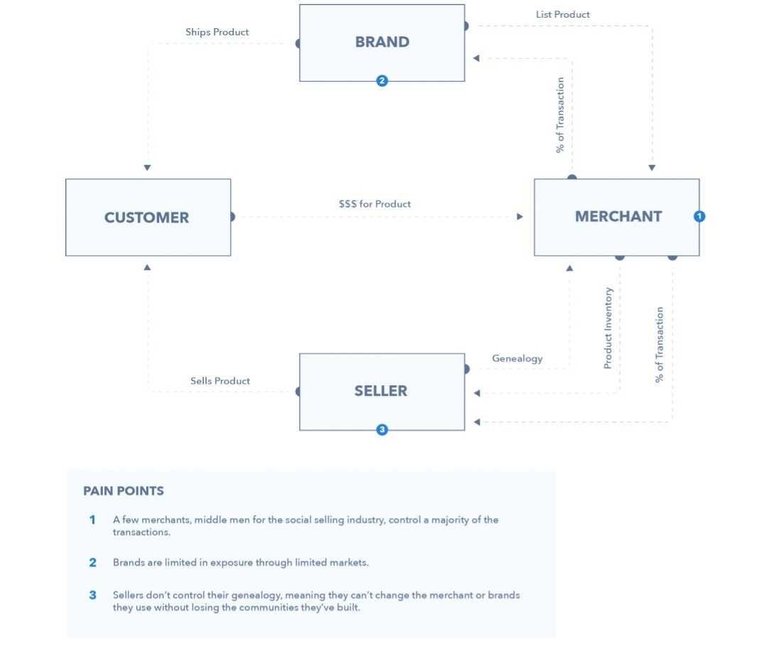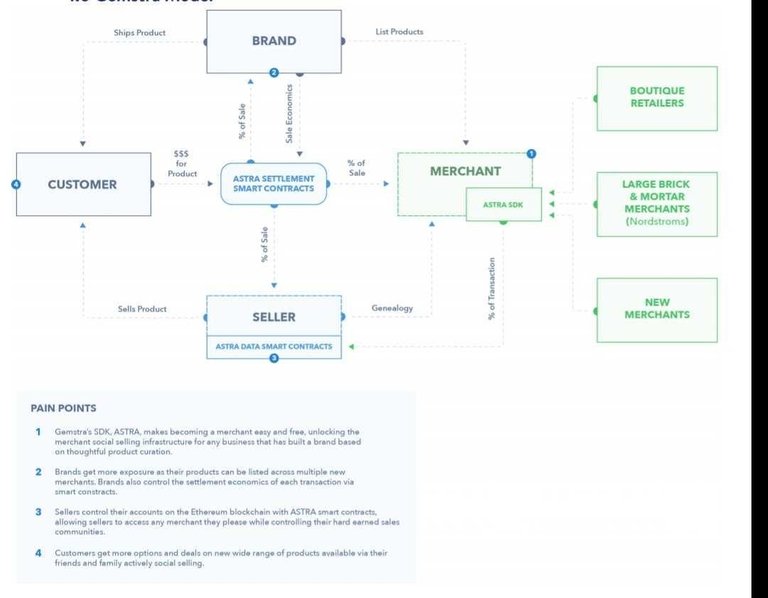
1.1 Overview
Gemstra’s mission is to make social selling accessible and awesome for everyone. Social selling,
traditionally called “direct selling”, utilizes multi-level selling models that rewards people (called “Sellers”
in the Gemstra ecosystem) for influencing sales through promoting brands to their social network.
Social selling is a large and growing industry, yet it is extremely captive and mostly unavailable to the
broader retail market.
Gemstra is building a blockchain-integrated ecosystem (ASTRA Platform) and token economy (GMS
Token) to unlock social selling to the entire retail market. ASTRA is a smart contract platform. It
leverages blockchain technology to put data back in the hands of sellers and enable retailers (called
“Merchants” in the Gemstra ecosystem) and brands from the $24 trillion global retail economy to join
social selling. Gemstra provides open source software and an SDK for Merchants to integrate with
ASTRA. The GMS Token will reduce friction as ASTRA’s default exchange of value, power gamification
and reward models native to social selling, and provide governance to democratize the ecosystem.
ASTRA Platform and the GMS Token are exactly what the stakeholders of social selling need - the de
facto infrastructure and reward economy for an unpredictably large market.
1.2 Background & Opportunity
Perhaps the earliest form of social selling was the advent of direct selling in the early 1900’s, when
Brands empowered independent representatives (“Sellers”) to sell their wares door to door, with a focus
on one-to-one demonstrations. The model has evolved over time and exponentiated in recent years with
the adoption of the Internet. Today’s Seller can market limitlessly through online sales, especially with
the rise of social media.
Gemstra disrupts a social selling industry worth over $180 billion worldwide ($35 billion US). More than
120 million people in world (20 million US) are involved in social selling. This number is growing between
7-10% annually and accelerating with global adoption of social media and expanding gig economy. Social
###selling presents the largest gig economy of the future and is likely to exceed $1 trillion worldwide in the
next 10 years.
1.3 Problem
The industry is walled off by few companies that have too much power.
Sellers Held Captive
Social selling is dominated by giants like Amway ($8.8B), Avon ($5.7B), and Mary Kay ($3.5B). These
merchants hold their Sellers captive by making it difficult, if not impossible, to transfer customer data,
transaction data, and genealogy (network) data. Sellers risk losing income they worked hard to earn
should they seek mobility. The average Seller works 10-20 hours per month and earns between $250-
$500. Earned income is generally added to help with the household budget. Today’s merchants have
too much leverage and power in the relationship with sellers.
Inefficient Market Cornered by Monoliths
Barriers to entry are high, limiting new merchants from entering the space. Expensive and fragmented
systems are required to manage commissions, rewards, accounting, customer service, back office
operations, and commerce - limiting the number of new merchants. The lack of market entrants further
reduces sellers’ options and opportunities, allowing incumbent monoliths to corner the growing
industry. Merchants in social selling can often get away with overpricing products, yielding an
inefficient market for sellers. Sellers are not able to compete with the brands in the broader retail
economy.
A solution that affords entry to more merchants and freedom to sellers is needed.
1.4 Current Model

1..5 Solution
Proof of Concept for Decentralized Social Selling
BOUTIQUES - A decentralized marketplace for social selling
Gemstra launched a proof-of-concept social selling marketplace called BOUTIQUES in July 2017 that
gives sellers the ability to choose brands and products they want to sell and invites brands from the
broader $24 trillion retail economy to participate by simply integrating their catalogs. BOUTIQUES
quickly attracted 3000 sellers and 8 brands generating 7-figure annualized merchandise sales within 9
months of launch. The rapid growth of BOUTIQUES proved that retail brands want to participate in
social selling and sellers desire freedom.
Blockchain-Integrated Solution for Broader Social Selling Industry
ASTRA - A smart contract platform
The success of BOUTIQUES inspired Gemstra to build a broader solution to liberate social selling to the
broader retail economy (worth over $24 trillion globally). ASTRA is a blockchain-integrated platform
that serves as technological infrastructure for social selling. ASTRA’s blockchain technology allows
sellers to keep customer and network data they worked hard to generate, merchants to host
transactions between multiple brands and myriad sellers, and brands to offer customized commission
and rewards as well as a portable catalog that can be integrated with any variety of merchants. ASTRA
promotes fair behavior and creates a trustless ecosystem for all actors in the social selling model.
Gemstra will make the BOUTIQUES software open source and develop a SDK for merchants and brands
to easily deploy a social selling business on ASTRA.
GMS Token - Exchange of value, rewards, gamification, and governance
By tokenizing ASTRA with the GMS Token, Gemstra reduces friction in the social selling transaction. GMS
is an ERC20 token that serves as the most cost-effective method of exchanging and storing value. GMS is
the default method of commission payment to Sellers. GMS can be used to purchase products at any
Merchant. More importantly, GMS powers a gamification system that can be customized by brands and
merchants for sellers. Gamification is the second most important form of incentive in social selling.
Gamification can be based on achievement or engagement. Community and recognition are primary
drivers of retention in social selling. Sellers form teams within a broader community that provides support,
encouragement, and accountability. Recognition within a community drives Sellers to grow or minimally
maintain their achievements. GMS provides an ideal reward construct that drives gamification through
community and recognition. Distributions awarded by voting and special access granted by staking are
GMS features that further incentivize Sellers to grow. Finally, GMS creates a system of governance within
ASTRA so its actors have decentralized control over changes made in the ecosystem.
1.6 Gemstra Model

Value to the Actors
Sellers
Sellers drive sales for Merchants and Brands through direct promotion and social influence. Previously,
Sellers were confined to a single merchant and risked losing their customers, teams, and incomes should
they seek mobility. (eg. An Amway rep cannot take her customer and transaction data with her should
she want to join another company.) For the first time, Sellers have the freedom to choose what they
want to sell and who they want to sell with. Sellers can participate with any Merchant (or Brand) in the
Gemstra ecosystem. All user and transaction data generated by Sellers belong to them in ASTRA. Sellers
control who can or cannot access this data in the ecosystem.
Merchants
Merchants administer software, host the genealogy (network), define the compensation (architecture)
plan, and provide the platform for Sellers to transact with their customers by selling products from
Brands. Merchants can easily participate in ASTRA by using BOUTIQUES open source software or
integrating ASTRA with their existing platforms through an SDK. Like in the broader retail economy,
Merchants are curators of Brands. (eg. Sephora curates more than 300+ brands in their 1200+ stores)
Brands can elect to operate as Merchants in ASTRA as well. (eg. Nike operates its own ecommerce site
and stores. Nike also sells through other retailers like Footlocker or Champs.) The Merchant layer allows
retailers from outside the industry to participate in social selling by activating dormant influencers /
customers and inviting Brands they already do business with. While this layer can be disintermediated,
Gemstra believes that the consumer economy will continue to value curation by Merchants.
Brands
Brands provide their catalog and define custom commission levels at Merchants they integrate with.
Brands can integrate with multiple Merchants to access different genealogies (networks) of Sellers and Customers. Brands can be their own Merchant in ASTRA as well. Each Brand’s catalog is made portable
on the blockchain. Sales volume information and other Brand data can be shared with Merchants and
Sellers to show product performance.
For more information
Website : https://gemstra.com/
Facebook : https://m.facebook.com/gemstraofficial
Twitter : https://mobile.twitter.com/gemstraofficial
Telegram : https://t.me/gemstra
Reddit : https://www.reddit.com/r/Gemstra/
Whitepaper : https://docsend.com/view/xvyqq7a
My profile:
https://bitcointalk.org/index.php?action=profile;u=1270952
My Ethereum Address:
ETH: 0x51349885bc7FF9AFfC64A6Edd95f465d98A917Ca
Congratulations @ponetwo! You have completed the following achievement on Steemit and have been rewarded with new badge(s) :
Click on the badge to view your Board of Honor.
If you no longer want to receive notifications, reply to this comment with the word
STOPDo not miss the last post from @steemitboard:
SteemitBoard World Cup Contest - The results, the winners and the prizes
Good project 👍